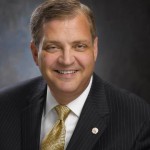In 1516, planting the seed of the Reformation. It was there that Martin Luther would discover the astonishing news of a gracious God and his free gift of righteousness.
The astonishing refreshment of the church in the years that followed was therefore the fruit, not of one man’s ingenuity, but the word of God. The Bible was why the church – and, indeed, all Europe – was turned upside down.
In the years that followed, Luther would become clearer and clearer on this. After getting the Reformation ball rolling in 1517 with his 95 theses, Luther found himself debating a number of Roman Catholic theologians. And more and more, the question of how the Bible relates to the church kept coming up. Luther’s first sparring partner, Sylvester Prierias, argued that the Scriptures ‘draw their strength and authority” from the Church of Rome, and in particular the Pope. Next, Cardinal Cajetan weighed in, claiming that Scripture must be interpreted for us by the Pope, who is an authority above Scripture.
As they saw it, the Bible was written by the church, and therefore the church is a higher authority that the Bible. As Luther saw it, the Bible is the word of God. The church is not its ultimate author. Quite the opposite: the church was created by the word.
As in the beginning God brought light, life and creation into being through his word, so through his word he brings his new creation into being (2 Cor. 4:6). The church has come into being because God has spoken.
The point became basic for the Reformers: the church is born of the word of God, and grows in both size and health by the word of God (Eph. 4:11-13). Indeed, wrote John Calvin, ‘wherever we see the word of God purely preached and heard, and the sacraments administered according to Christ’s institution, there, it is not to be doubted, a church of God exists.’
Five hundred years later, this is a truth that needs to be heard loud and clear: the church receives its life and health and growth from the word of God. We especially need to hear this again in post-Christian Europe, where the situation is generally so disheartening. Faced with reams of horrifying statistics about church decline, a wearing negativity or defeatism can set in. Focused on the sheer enormity of the uphill battle before us, a siege mentality can develop. Losing the confidence to step out with the old word of God, we circle the wagons and lose the confidence to step out into the world. Or we look elsewhere for the solution. But Christians can know that we are not mere teachers of an unfashionable message, nor salesmen of one religious product: we herald the very word of God. The word of God entrusted to us is the very power of God which does not return empty, and which will one day drive all darkness away for good.
This is the need of the hour. If we are to see a reformation and refreshment of the church today, we need churches filled with the glorious and surprising news of Jesus held out in his word.
Five hundred years later, we are looking forward – looking forward to seeing God’s word go out in our generation, fueling the mission of the church and enlivening it again.


